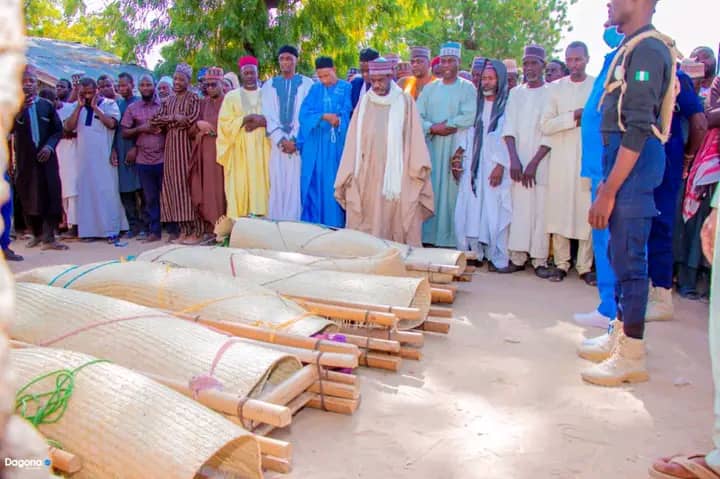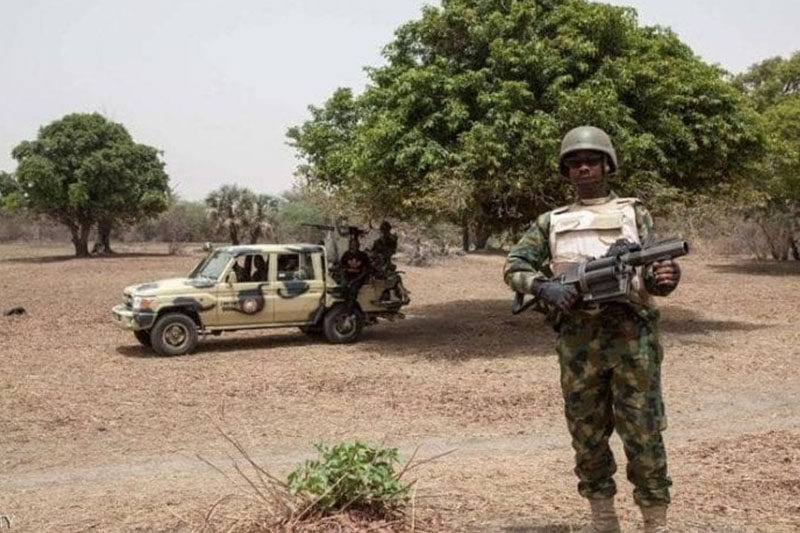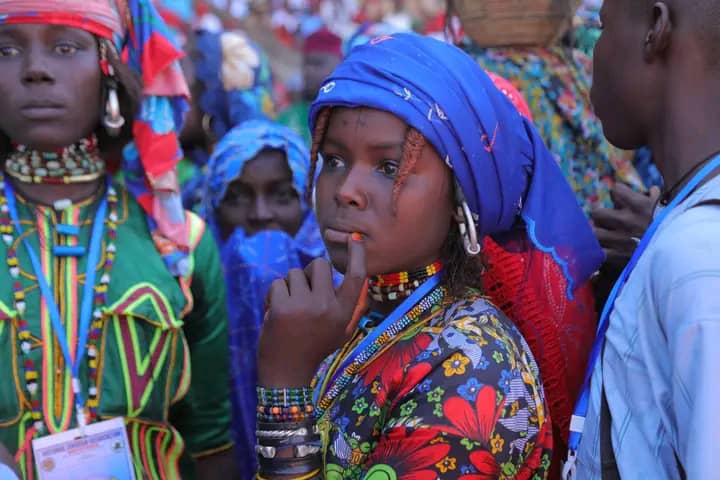President Muhammadu Buhari made a special visit to Maiduguri in Borno State on Thursday, August 18, where he commissioned the construction of teachers’ quarters and, to mark Humanitarian World Day on Friday, he also provided aid to thousands of internally displaced persons and other vulnerable people in the state by distributing massive amounts of food and other essential items.
Photographs taken during his visit show Buhari and others standing in front of huge piles of bags containing food and other aid items which were to be distributed among the homeless and hungry.
The president commissioned 500 resettlement houses – part of the 10,000 houses for IDPs he promised last year – in Molai on the outskirts of Maiduguri. More than 6,000 houses have been completed so far.
This year’s theme for the annual United Nations World Humanitarian Day was, “It takes a village to support people in crisis”.
And, as the UN observed: “Today we face record levels of humanitarian need. Never have so many crises converged, including conflicts, the climate emergency, a global pandemic, hunger and displacement. Our world is under enormous stress and the most vulnerable people can no longer cope.”
Unfortunately, most internally displaced persons (IDPs) in northeastern Nigeria are among the most vulnerable people in the world.
RNI went to Sulumburi Karshen Kwalta IDP camp, an unofficial – not state-run – shelter for IDPs in Maiduguri to speak to residents and to assess their humanitarian needs.
Modu Aji told RNI that he was originally from Kaffa village in the Damboa Local Government Area but had been living in the camp for years.
“For all that time, we have not had any humanitarian aid from either the government or local or international non-governmental Organisations (NGOs). Life is very difficult here as we don’t have enough food to eat and we don’t even have proper shelters. In the rainy season we find it difficult to sleep inside the tents that we built because the water comes inside.
“Apart from this, the major challenge is that our children are not being educated. We don’t have the means to enrol them into schools outside the camp. The children just roam the streets. They do not get any kind of education, neither Western nor Islamic. But sometimes we parents will each contribute ₦20 to send the children to a Tsangaya school in the neighbouring community of Sulumburi. I have 14 children and not one of them is going to school; they just roam the streets.”
Aji said the camp residents desperately needed the government and the humanitarian agencies to come to their aid by providing food, essential items and educational support for their children either by enrolling them in schools or by building a temporary school within the camp.
Falmata Mala Ali, who also lives in the camp, said: “I originally came from Kaduwa village in the Konduga Local Government Area. I had to flee because of the Boko Haram [Jamā’at Ahl as-Sunnah lid-Da’way Wa’l-Jihād – JAS] insurgency and I have lived in this camp for almost nine years now. Before the insurgency we used to have a sustainable means of livelihood through business and farming activities, including rearing animals, but now we can’t even afford to rear pigeons or chicken. We cannot afford to have three square meals a day because of our abject poverty.
“We have been living like this for the past nine years without humanitarian assistance either from the government or the NGOs. Even when our thatch houses and tents were gutted by fire, no one supported us even with a one piece of rice.”
Ali said the International Organisation for Migration (IOM) had distributed soaps and detergents and had also built toilets in parts of the camp. But, he said, even the IOM team had not been to the camp for the past three to four months. They were not even helped to clear their pit latrines. He did not know why the IOM had stopped helping them.
“We are begging the government and the NGOs to provide us with any humanitarian assistance to cushion our hardships. We desperately need healthcare services because many women and children are suffering from malnutrition, as well as malaria and some water-borne diseases. We don’t have a clinic in the camp and we cannot afford to get medicines or proper treatment. Our environment is very dirty and unhygienic because there is a lot of stagnant water left over in the rainy season. It’s the stagnant water that increases the chances of getting outbreaks of malaria, typhoid and cholera. I don’t know what we would do if there was an outbreak of these in the camp. It’s particularly worrying for the children, many of whom suffer from malnutrition.”
Ali said there was not even a functioning clinic or hospital in the neighbouring community of Sulumburi.
“We heard that the government had built a clinic in the Fulatari community but it’s not open yet. That’s why, when our children or relatives fall sick, we take them to the general hospital in the city [Maiduguri] but the medical services are not free. We have so many challenges we have to face each day. We urgently need humanitarian aid. If we don’t get care soon the humanitarian crisis will get worse.”
Yahaya Alhaji Dunoma, a legal practitioner, told RNI that the deteriorating humanitarian crises were because international aid had been cut in Borno State.
“World Humanitarian Day is a day set aside by United Nations to celebrate those who provide humanitarian care and address humanitarian crises worldwide. It is a day that should be celebrated by all of us. But not everyone gets the aid they need.
“When the Boko Haram crisis started in 2009, Borno State was hit badly and suddenly there was a humanitarian crisis which the Nigerian government could not resolve alone. That was what prompted the international NGOs to offer services, such as building shelters and providing healthcare, education, security, entrepreneurial and skills training, food, among others.
“There has been much government and the humanitarian support, which has helped to ensure the relative peace now being enjoyed in Borno State and, by extension, in the northeast as a whole.”
But, Dunoma said, much of the support and assistance given to vulnerable communities – particularly IDPs – had now stopped. There were many who were totally dependent on that support and these were the people who were suffering the most now.
He described their situation as a huge humanitarian crisis, saying it would only get worse if they did not receive urgent aid.
He said loss of international assistance would have a major impact on the government because they would have to take over the humanitarian services previously provided.
“Because the level of the insecurity is much lower compared with some years back, many of the state-run IDP camps were officially shut down by the government and the people were resettled in their ancestral homes. But there are still communities and informal IDP camps, where there are people who desperately need humanitarian aid. That’s why it is vital that the federal, state and local governments continue to provide humanitarian aid, even to those who are back in their hometowns.”
SHETTIMA LAWAN MONGUNO








